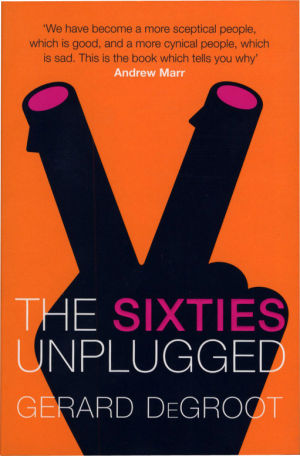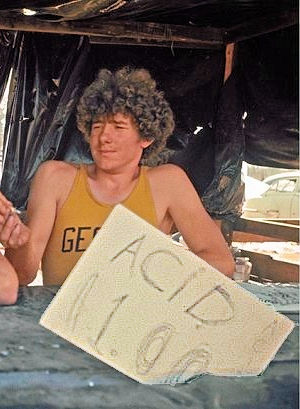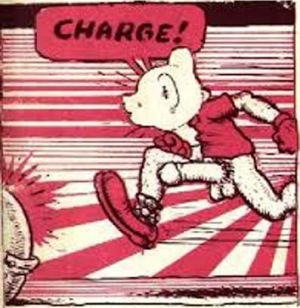2012-03-02
The Sixties Unplugged

What a wonderful decade the sixties were. A small group of students at both sides of the Atlantic changed the world forever, by making weird music, weird posters and even weirder sex, and since then we live in continuous paradise. Of course this is utterly bollocks but for the bulk of I Remember the Sixties-books this is the general atmosphere they exhale. For the business hippies, who have made successful careers out of the sixties by rehashing pink coloured memories in their coffee table books, the legend has become reality, but they are probably just a minority. The sixties had a silent majority, in- and outside the Underground, that will never be heard.
In 1988 Jonathon Green compiled an oral history of the sixties titled: Days In The Life: Voices from the English Underground 1961-71. In it a constellation of Underground self-proclaimed heroes repeated the clockwork adagio that the sixties were fantastic, but this book was the first, for me at least, that contained some less triumphant testimonies as well. Nicola Lane, who by her own account 'did little other than sit in a corner, roll joints and nod when required' had a stab at the sexual morals of the period in general. Susan Crane (better known as Sue Miles) confirmed that the Beat movement was very sexist towards women, invariably called chicks, and when her husband Barry Miles had those very important International Times meetings her job was 'to make the tea and the sandwiches' and to leave the room 'whenever they were going to actually take decisions'. Which she did.
Another International Times-founder Jim Haynes, by definition a messiah of the Underground, was described by Cheryll Park, then a 19-year old coming from the North of England, as a sexual pervert who wanted her to end up in his bed with six other women. “I'd love to meet Haynes again, now that he's a shrivelled-up old man, and humiliate him in the way he humiliated me.”, she snapped. Be it Jim Haynes, Julian Assange or Dominique Strauss-Kahn, some men will never ever change.
In The Sixties Unplugged, Gerard De Groot repeats the above testimonies of Nicola Lane, Sue Miles and Cheryll Park. The book already appeared in 2008, but I was unaware of it until now. A few copies ended up in the sales bin of a local bookshop and that is how I got hold of it. I hesitated first as the book, at first glance, seemed to be a mere recollection of the counter-culture in America, but browsing through the contents I saw that the author also had things to add about Biafra, China, Congo, France, Germany, Great-Britain, Holland, Indonesia, Vietnam and even our closest extra-terrestrial neighbour, the Moon.

Ronnie takes a trip
The Sixties Unplugged is a decade's compendium in 67 short essays and rather than repeating what good things came out of it, it attempts to describe where we went wrong. The book is sceptical, ironical and cynical but also utterly readable, vivid and funny at places. What could have been lying on your stomach as a gloomy brick becomes the proverbial box of chocolates, especially thanks to the many unexpected anecdotes that lighten it up. De Groot constantly dips his pen in a vitriolic inkpot (does anybody in the 21st century understand this?) and like a pigeon flying over an open air statue exhibition he has plenty of choice where to launch his droppings.
I do have the impression that De Groot has more fun in ridiculing the liberal caste than the conservative one, but I could be wrong as we have been taught that the sixties were generally progressive anyway. It is true that lots of noise was coming out of progressive circles... in Amsterdam, Berlin, Paris or London... but De Groot also notes that 20 miles outside the city or university centres life went on its usual conservative way. As a matter of fact, while the progressive thinkers were believing that they were going to change the world by smoking pot and listening to Hendrix guitar solos the conservative movement was silently preparing its coup with repercussions that are still visible today.
But some changes even the conservatives didn't see coming. A bit like Rick Santorum now, a certain Ronald Reagan was first laughed away by his fellow republicans and called 'a flagrant example of miscasting'. The man didn't know anything about politics, they quipped and this was probably true, but that was precisely Reagan's strength. He started his career by saying that he wasn't a politician but a simple citizen who understood the needs of the common Californian. While his opponents, republicans and democrats alike, were sneering at him from their élite business millionaire clubs, smoking expensive cigars and showing general disdain for their voters, Reagan proved that the time was ripe for popular conservatism, based on easy to digest one-liners (“One of the great problems of economics is unemployment.”).
To get elected in 1966 Reagan needed to convince over a million of democrat voters to cross over to his side and paradoxically enough one of the issues that helped him to achieve that were... the hippies. Berkeley had a history of tumultuous student uprisings (free speech movement, Vietnam war protest & People's Park) that had infested other Californian universities as well. Reagan only needed a one-liner to describe those radicals: “His hair was cut like Tarzan, and he acted like Jane, and he smelled like Cheetah.”
Those beatniks at Berkeley University thought they were changing the world, and they did indeed, but not as they intended. Ronald Reagan got elected in California... This was the start of a brilliant political career and may have been the pivotal point turning the world into an arena of conservative capitalism...

There's a killer on the road
Did anybody notice dead bankers hanging on trees, lynched by an angry mob lately? I don't think so. But we did see poor, unemployed and homeless people, frozen to death this winter, because this crisis – created out of greed – has hit them hard. Jean-Luc Dehaene, ex-prime minister of Belgium and representative of the Christian Labourers Union, will receive a tax-free bonus of 3.26 million Euro (4.35 million dollars) this year. He is the man who led the Dexia bank to its bankruptcy, well knowing that the Belgian government would be obliged to intervene. The Belgian caution for the Dexia 'bad bank' is 15% of our BNP, so if the holding goes into liquidation, a scenario that is not improbable, all Belgians will face a general tax increase and cutbacks on all social programs...
Speaking about Belgium, my little country gets a mention in Gerard De Groot's book as well. Congo, once the sadistic playground of a Belgian king who thought that cutting off hands was a pleasant pastime, got independent in 1960. When its first democratically elected leader, Patrice Lumumba, had the guts to insult the Belgian king on Congo's independence day this was nothing less than an invitation to murder.
Not that the Belgians were playing solo, on a White House meeting in August 1960 president Dwight D. Eisenhower vaguely proposed to assassinate Lumumba and CIA director Allen Dulles, who described Lumumba as a mad dog who needed to be put down, immediately gave orders to his secret agents to come up with a cunning plan.
While the CIA was thinking of an all-american-superhero sophisticated way to get a poisoned toothbrush over to Congo and hand it over to the prime minister the Belgians had a much simpler idea. Under mild Belgian pressure Lumumba was arrested, ceremonially and perpetually beaten and tortured and finally shot through the head while four Belgian officials were looking, mildly amused, from a few yards distance. Incidentally, the prime minister of Belgium who was aware of this all, Gaston Eyskens, belonged to the same Christian party as Jean-Luc Dehaene now, but this is of course just a silly coincidence.
Although Gerard De Groot obviously agrees that this was an act of 'cynical criminality' he refuses to believe in the Lumumba myth, that is as big in Africa now as the Che Guevara-myth in the sixties. De Groot quips Lumumba would have been assassinated anyway and if not, he dryly adds, the Prime Minister would probably have grown into a typical African corrupt dictator just like his spiritual heroes Nkrumah, Nyerere or Kenyatta.

Love, peace & happiness
And these are just two of the 67 essays in this book. The general rule is that De Groot shows almost no respect for anybody (with some notable exceptions here and there) although there is of course not always reason for respect in his stories.
Biafra had an outburst of ethnic and political violence from 1966 to 1970 causing one to two million deaths, most of starvation. This happened while the 'civilised' world was dutifully monitoring the situation and organising UN congresses.
China had a few uprisings in the mid sixties. In 1968 communist government troops killed 200 thousand rebels in the Guanxi province, although the term rebel could mean women, children, babies or someone wearing glasses or the wrong clothes. One of the weirder, perhaps tribe related, rituals in Guanxi was to eat the enemy and over 3000 cannibalistic acts in the name of communism have been documented. Called an orgy of violence by Gerard De Groot the Cultural Revolution would make 2.8 million victims, although these numbers greatly vary from source to source. The amount of people persecuted, imprisoned, beaten, tortured or raped out of love for the Great Helmsman is estimated to at least a tenfold of the previous number.
That not all political violence had a communist signature was proven in Indonesia. In September 1965 and the months to follow between 500 thousand and one million 'communist' sympathisers were killed in Indonesia, with just a little help of the intelligence services of Great Britain and the USA. Joseph Lazarsky, deputy station CIA chief in Jakarta, revealed that the CIA had made a top 5000 hit-list to help the government troops. The list was crossed off as enemies were liquidated and as an extra bonus president Suharto received lucrative contracts with American Express, British American Tobacco, British Leyland, General Motors, Goodyear, ICI, Siemens and US Steel...
The shameful lesson of this book is that in 30 or 40 years time, absolutely nothing has changed in this world, except perhaps for the fact that in Syria people now have smartphones and can put music in their ears to stop hearing the falling bombs.

Parallel lines
One review of the book I found on the net says that Sixties Unplugged often follows very familiar lines.
Although he claims that his work is 'more global than any book previously produced', it is dominated by American characters and events, most of which have been written about dozens of times before. His selection policy is nothing if not orthodox, so his opening sections cover such well-worn topics as the origins of the transistor, the invention of the Pill and the poetry of the Beats. Later, we read about the Bay of Pigs, the Cuban Missile Crisis, the expansion of the Vietnam War, the development of the hippy movement and the Civil Rights marches. The supporting cast is the usual mixture of hairy protesters and senior politicians, above all Presidents Kennedy and Johnson.
There is some truth in that, and when Gerard De Groot hits the ground I am a bit familiar with, namely the British psychedelic scene, all he can come up with are testimonies from a book that appeared twenty years ago. Sometimes he even tries too hard to make a point. I don't think that using British Underground quotes to add value to an American situation is really deontological. And there is a certain shock-jock aspect present as well, as the chapter 'Summer Of Rape', amongst others, shows:
Rape was popular in the Summer of love. Rape was easy because there were so many naïve young girls separated from parental protection.
or, quoting some juicy sixties newspaper article...
A young long-haired girl stripped and danced in the warm rain... (…) Her friends stood by while a dozen young men raped her in an animal frenzy.
But it needs to be said that the sensational stories and its many anecdotes make this book a real page-turner. Gerard De Groot likes to divulge that every important man has his smaller side. Martin Luther King, for instance, not only had a dream but also a busload of extramarital affairs and probably that is one of the few things he had in common with JFK. If sex oozes from the pages, it is because the sixties had a sexual revolution and revolutions not only tend to liberate but often lead to an aftermath of violence as well. One hippie leader literally said that women needed breaking like a horse before entering his commune (I wonder how he could get any female followers) and the average discours érotique of the Black Panthers Party then wasn't really different from gangsta-rap today.

The Hole in the Ozone Layer
There aren't a lot of women in the book, and when there are they don't always like to be reminded of the sixties. Bernardine Dohrn's 1969 eulogy to Charles Manson, for instance, can't be found on her CV at the Northwestern University School of Law and neither is the fact that she once was one of the most wanted terrorists of the United States. But of course that is nothing to be proud of, The Weathermen only succeeded in blowing their own members to pieces rather than turning America into a communist republic.
In September 1967 hundreds of New York Radical Women assembled before the Miss America contest in Atlantic City. They massively removed their bras, much to the enjoyment of the watching crowd, threw those in a dustbin and set the contents on fire. Unfortunately, this is one of the sixties feminist myths that is just that, a myth. The truth was slightly different. About twenty protesters threw some symbolic girlie stuff in a trashcan: girdles, bras, makeup, curlers, mascara, shoes... and apparently they also crowned a sheep as Miss America, but that was all that happened.
A reporter however called it bra-burning and from then on the legend mushroomed until the point was reached that feminists really started to believe in burning bras or protesting topless, a tradition that happily lingers on till today, but now you will call me a male chauvinist pig probably.
According to The Sixties Unplugged the decade ended in 1971 with the obscenity trial of Oz. One of the questions was if a bawdy cartoon of Rupert Bear (made by a fifteen years old) was obscene or not. The judges decided it was but nobody really cared any more. The world had changed, only the judges didn't know it yet.
Despite some flaws this is a very interesting book indeed. Even with 67 chapters and almost as many topics it gives you something to chew on and makes you start thinking. Lucky we have Wikipedia nowadays, to further dig into those subjects one really digs... but what did the sixties bring into our world then, other than perpetual paradise... Gerard De Groot:
The decade brought flowers, music, love and good times. It also brought hatred, murder, greed, dangerous drugs, needless deaths, ethnic cleansing, neocolonialist exploitation, soundbite politics, sensationalism, a warped sense of equality, a bizarre notion of freedom, the decline of liberalism, and the end of innocence.
Groovy man, really groovy...
Sources (other than the above internet links):
De Groot,
Gerard: The Sixties Unplugged, Pan Macmillan, London, 2009.
Green,
Jonathon: Days In The Life, Pimlico, London, 1998, p. 60, 119,
418-419, 448 (first edition: 1988).

